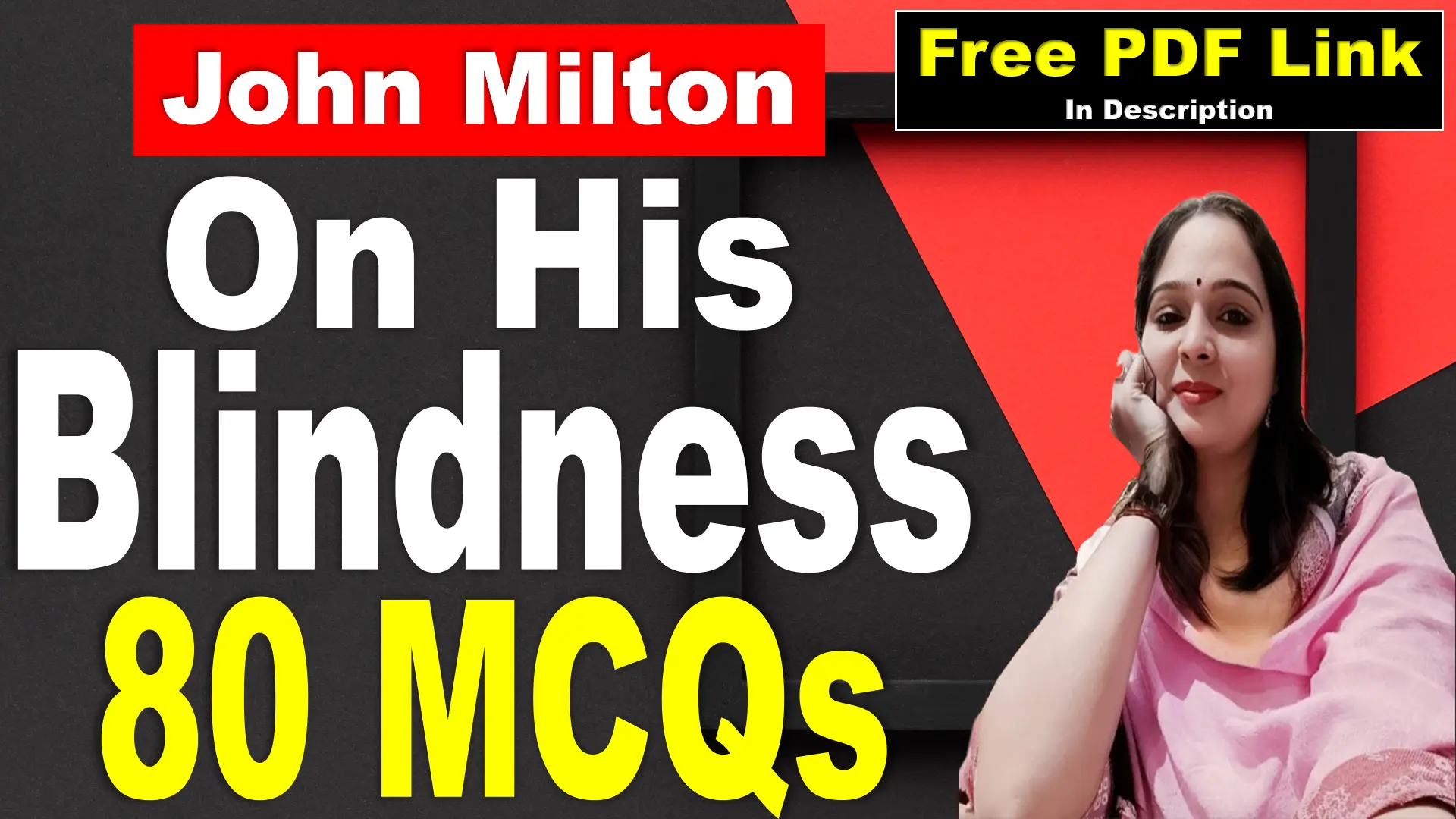
Melancholy by John Fletcher Questions and Answers
Very Short Answer Questions
Q: Who is the author of the poem “Melancholy”?
A: The author of the poem “Melancholy” is John Fletcher.
Q: What is the main theme of the poem?
A: The main theme of the poem is the exploration of melancholy.
Q: What is the form of the poem?
A: The poem is written in verse form with a varying rhyme scheme.
Q: What is the tone of the poem?
A: The tone of the poem is contemplative and introspective.
Q: What does the speaker find sweet in life?
A: The speaker finds melancholy to be the only sweetness in life.
Q: What is the setting of the poem?
A: The setting of the poem is suggested to be a quiet, introspective environment.
Q: What does the speaker welcome in the poem?
A: The speaker welcomes the physical manifestations of melancholy: folded arms and a gaze that’s intense.
Q: What sounds does the speaker feed upon?
A: The speaker feeds upon the sounds of a midnight bell and a parting groan.
Q: What does the speaker do in a still gloomy valley?
A: The speaker stretches their bones in a still gloomy valley.
Q: What does the speaker compare vain delights to?
A: The speaker compares vain delights to the shortness of nights.
Q: What does the speaker criticize in the poem?
A: The speaker criticizes those who waste their time in frivolous pursuits.
Q: What does the speaker suggest about wisdom?
A: The speaker suggests that if people were wise, they would realize that there’s nothing truly satisfying in life.
Q: What does the speaker describe in the poem?
A: The speaker describes their experiences and feelings associated with melancholy.
Q: What does the speaker find dainty sweet?
A: The speaker finds lovely melancholy to be dainty sweet.
Q: What does the speaker associate with pale passion?
A: The speaker associates fountain-heads and pathless groves with pale passion.
Q: What creatures are awake during the speaker’s moonlight walks?
A: During the speaker’s moonlight walks, bats and owls are awake.
Q: What does the speaker compare fleeting pleasures to?
A: The speaker compares fleeting pleasures to the brevity of night.
Q: What does the speaker suggest about the nature of happiness?
A: The speaker suggests that happiness is transient.
Q: What does the speaker find in melancholy?
A: The speaker finds a unique kind of sweetness in melancholy.
Q: What does the speaker do with their gaze and tongue?
A: The speaker lowers their gaze and is unable to speak, metaphorically describing their tongue as chained up.
Short Answer Questions
Q: What is the central theme of the poem “Melancholy” by John Fletcher? A: The central theme of the poem is the exploration of melancholy. The speaker finds a unique kind of sweetness in sadness and solitude. They suggest that there’s a certain wisdom in recognizing and embracing these moments of melancholy.
Q: How does the speaker in the poem view melancholy?
A: The speaker views melancholy as the only real sweetness in life. They welcome the physical manifestations of melancholy and feed upon the sounds associated with it. They find a unique kind of beauty and wisdom in recognizing and embracing moments of melancholy.
Q: What kind of imagery does John Fletcher use in the poem?
A: Fletcher uses vivid and rich imagery in the poem. He describes “fountain-heads and pathless groves”, “moonlight walks”, and a “still gloomy valley”. He also mentions the sounds of a midnight bell and a parting groan. This imagery paints a vivid picture of quiet, introspective moments.
Q: How does the poem reflect the speaker’s state of mind?
A: The poem reflects the speaker’s state of mind through its contemplative and introspective tone. The speaker is in a state of deep thought, reflecting on the nature of melancholy. The use of vivid imagery and metaphors further convey the speaker’s feelings and experiences.
Q: What poetic devices does John Fletcher use in the poem?
A: Fletcher employs several poetic devices in the poem such as metaphor, imagery, personification, oxymoron, and repetition. He uses metaphorical language to convey the speaker’s feelings and experiences. The rhyme scheme varies, and the meter is closest to iambic tetrameter.
Q: How does the speaker describe the places and times that evoke melancholy?
A: The speaker describes the places and times that evoke melancholy as quiet natural settings and moonlit walks when most creatures are asleep except for bats and owls. They mention “fountain-heads and pathless groves” and a “still gloomy valley”, indicating a natural, serene setting.
Q: What does the speaker suggest about wisdom in the poem?
A: The speaker suggests that if people were wise, they would realize that there’s nothing truly satisfying in life. They assert that the only real sweetness in life comes from melancholy. This suggests that there’s a certain wisdom in recognizing and embracing these moments of melancholy.
Q: How does the speaker convey the physical manifestations of melancholy in the poem?
A: The speaker conveys the physical manifestations of melancholy by describing them as “folded arms and fixed eyes”, and a gaze that’s so intense it’s almost painful. They also describe a person in a state of deep melancholy, with their gaze lowered and unable to speak, metaphorically describing their tongue as chained up.
Q: What does the speaker feed upon in the poem?
A: The speaker feeds upon the sounds associated with melancholy: the tolling of a midnight bell and a parting groan. These sounds create a somber mood that the speaker finds appealing.
Q: What message does the poem “Melancholy” convey?
A: The poem conveys the message that there can be a certain beauty and wisdom in recognizing and embracing moments of melancholy. It suggests that these moments of introspection can offer a unique perspective on life.





